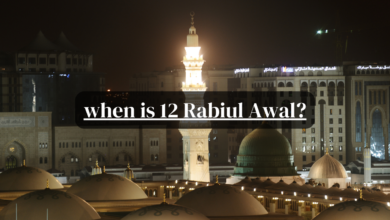
What is Hell in Islam?
Hell, or “Jahannam” in Arabic, is a place of intense punishment and suffering in Islamic theology. It is where those who have committed grave sins and rejected God’s guidance will be sent in the afterlife.

Introduction-What is Hell in Islam?
Hell, in Islamic theology, is a concept that holds immense significance. It is a place of punishment and torment reserved for those who have committed grave sins and have rejected God’s guidance. In Islam, Hell is described vividly in the Quran and Hadith, serving as a deterrent and a reminder of the consequences of one’s actions in this world and the hereafter. In this article, we will explore what Hell means in Islam, its descriptions, and the role it plays in the faith.
The Islamic Concept of Hell
In Islam, Hell is known as “Jahannam.” It is one of the fundamental beliefs of the Islamic faith and is mentioned extensively in the Quran, which is considered the word of God as revealed to the Prophet Muhammad. The Quran describes Hell as a place of unimaginable suffering and torment, a stark contrast to the eternal bliss of Paradise (Jannah) that awaits those who lead righteous lives.
Also check.
- Why is Pork Haram in Islam?
- What is a gin in Islam?
- Is Popeyes Halal?
- Is Islam Monotheistic?
- What was the first battle that Prophet Muhammad fought?
Descriptions of Hell
- Fire and Punishment: Hell is often depicted as a place of intense heat and fire. The Quran mentions that the fuel for this fire is humans and stones, symbolizing the severe punishment that awaits sinners. The intensity of the fire is beyond human comprehension, and its flames are relentless.
- Tormenting Angels: Islamic tradition speaks of angels called “Zabaniyah” who are responsible for punishing the inhabitants of Hell. They are fierce, cruel beings who carry out the orders of Allah with unwavering precision. These angels ensure that every soul in Hell faces the consequences of their deeds.
- Various Levels: Just as Paradise has different levels of reward, Hell also has different levels of punishment. The severity of punishment in Hell corresponds to the severity of the sins committed in one’s earthly life. Some individuals may experience milder punishment, while others endure excruciating torment.
- Eternal Suffering: One of the most profound aspects of Hell in Islamic theology is that it is eternal. Those condemned to Hell will not find relief or escape from their suffering. The Quran emphasizes this aspect to stress the gravity of sin and the importance of leading a righteous life.
- Descriptions of Punishments: The Quran describes various forms of punishment in Hell, including scalding water, boiling oil, and the “tree of Zaqqum,” whose fruit is like the heads of devils. These descriptions serve as powerful metaphors for the anguish and suffering that await those who have strayed from the path of righteousness.
The Purpose of Hell in Islam
- Deterrence: The concept of Hell serves as a powerful deterrent against sinful behavior. Believers are reminded that their actions have consequences, not only in this world but also in the hereafter. The fear of Hell can motivate individuals to lead virtuous lives and avoid sinful behavior.
- Justice: Hell is seen as a means of divine justice. It ensures that those who have committed heinous crimes and refused to repent face the consequences of their actions. In Islam, God is considered just and merciful, and Hell is an expression of His justice.
- Test of Faith: The belief in Hell also serves as a test of faith. Muslims are expected to have faith not only in the existence of God but also in the consequences of their actions. Belief in Hell reinforces the idea that every individual is accountable for their deeds.
Conclusion
Hell in Islam is a concept of profound theological significance. It represents a place of unimaginable suffering and serves as a reminder of the consequences of sinful behavior. While Hell is a terrifying concept, it is also a testament to the mercy and justice of God. Believers are encouraged to seek God’s forgiveness and guidance, striving to lead righteous lives and avoid the path that leads to Hell. Ultimately, the concept of Hell reinforces the central Islamic belief in accountability and the importance of moral and ethical conduct in this life.

FAQs-What is Hell in Islam?
What is Hell (Jahannam) in Islam?
Hell, or “Jahannam” in Arabic, is a place of intense punishment and suffering in Islamic theology. It is where those who have committed grave sins and rejected God’s guidance will be sent in the afterlife.
How is Hell described in the Quran?
The Quran describes Hell as a place of scorching fire, with intense heat and flames fueled by humans and stones. It emphasizes the severity and eternity of the suffering.
Are there different levels of punishment in Hell?
Yes, Islamic tradition suggests that Hell has various levels of punishment, with the severity of torment corresponding to the gravity of one’s sins committed during their earthly life.
Who administers the punishments in Hell?
Angels known as “Zabaniyah” are believed to be responsible for administering the punishments in Hell. They are described as fierce and unrelenting beings who carry out God’s orders.
Is Hell eternal in Islam?
Yes, according to Islamic belief, Hell is eternal. Those condemned to Hell will not find relief or escape from their suffering, emphasizing the gravity of sin.
What is the purpose of Hell in Islam?
Hell serves as a deterrent against sinful behavior, a means of divine justice, and a test of faith. It reminds believers of the consequences of their actions, reinforces God’s justice, and tests their faith in both the existence of God and the accountability for their deeds.
Can someone repent and avoid Hell in Islam?
Islam emphasizes repentance and seeking God’s forgiveness. A sincere repentance can lead to God’s mercy, and it is believed that God’s forgiveness is vast and encompassing. However, one must genuinely repent and strive to lead a righteous life.
What is the relationship between Hell and Paradise (Jannah) in Islam?
Hell and Paradise are contrasting destinations in the afterlife. While Hell is a place of punishment, Paradise is a place of eternal bliss and reward for those who have led virtuous lives and followed God’s guidance.
How does belief in Hell impact the behavior of Muslims?
Belief in Hell serves as a moral compass, motivating Muslims to lead righteous lives, avoid sinful behavior, and seek God’s guidance and forgiveness. It reinforces the concept of accountability and ethical conduct in this life.
Are there any variations in the concept of Hell among different Islamic traditions?
While the core concept of Hell is consistent across Islamic traditions, there may be variations in interpretations and emphasis on specific aspects among different schools of thought and cultures within the Muslim world.




